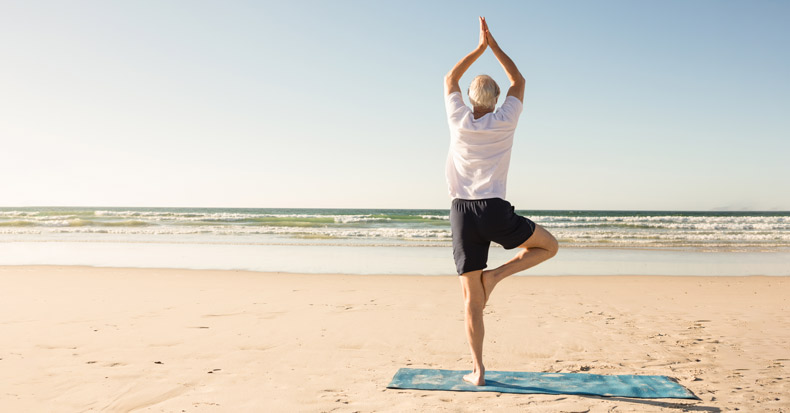What do low back pain and balance have to do with one another? Well, a lot! First (and most obvious), poor balance can lead to falling, which is the number one cause of injuries after the age of 70 (which includes low back pain). Unfortunately, as we age, we lose both balance AND bone density – a double whammy when it comes to falling as this combination can result in fractures of the vertebra, commonly in the lower back region. Below is a chart that shows what the “normal” length of time we should be able to stand on one foot (eyes open and eyes closed):

As this chart illustrates, over time, we rapidly lose our ability to balance, especially when we close our eyes. In fact, many of us cannot stand on one leg with our eyes closed for more than a few seconds well before the age of 59! Try it! Stand up in a corner of a room or in a doorway where you can grab onto the wall or door jams if you lose your balance. (We certainly do not want you to fall during this test!) Look at your watch or a clock with a second hand and count out loud in time with each second on the clock, “one thousand one, one thousand two, one thousand three, …..”—you get the idea. Once you have the rhythm down, try counting first with your eyes open for up to 30 seconds and then try it again but with your eyes closed. Quite different, isn’t it? Now, switch legs and try it again – eyes open first and then eye closed counting in time with the passing of each second. If you’re not pleased with your performance, try it over again a few times. If you’re like most of us, you may feel a little inadequate right now. Most of us need to start including some “balance exercises” into our daily routine.
So, why is it that we lose our balance so easily as we age? This is mostly because we become less active or more sedentary as we advance in age, partially because we’re not interested in doing activities that require balance, but also because of fears, like of falling down. Remember, when we were young(er), we romped around and bounce off walls and fell all the time. It was “routine” to come home from school with grass stains on our knees and backyard sports always resulted in falling, sometimes pretty hard! Rolling down a hill to purposely getting dizzy was quite attractive to us as kids – but certainly not now! In fact, getting on the floor to play with the grand kids usually leaves us sore for at least a few days. Now, I’m not suggesting we all run out and start rolling down hills, jump up and down, or purposely fall down but including active “balance” exercises into our daily routine is THE LEAST we should do. So, go for a brisk walk or a slow jog, ride a bike, walk in the park on uneven ground – it’s good for our “proprioception!”
Thousands of Doctors of Chiropractic across the United States and Canada have taken "The ChiroTrust Pledge":
“To the best of my ability, I agree to
provide my patients convenient, affordable,
and mainstream Chiropractic care.
I will not use unnecessary long-term
treatment plans and/or therapies.”
To locate a Doctor of Chiropractic who has taken The ChiroTrust Pledge, google "The ChiroTrust Pledge" and the name of a town in quotes.
(example: "ChiroTrust Pledge" "Olympia, WA")
Content Courtesy of Chiro-Trust.org. All Rights Reserved.

